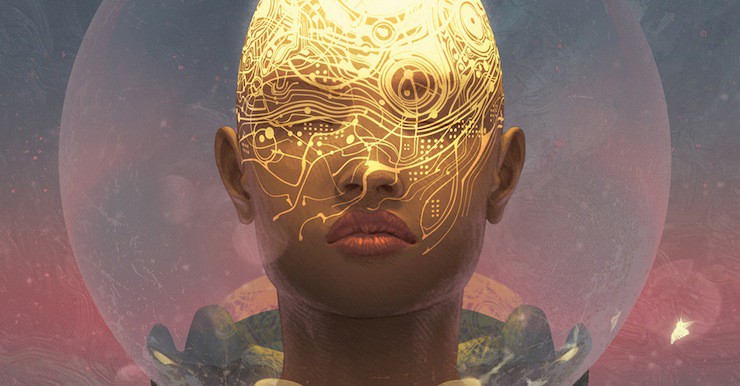Welcome back to the Short Fiction Spotlight, a space for conversation about recent and not-so-recent short stories. Before a brief break, we’d discussed the special “Queers Destroy Science Fiction” issue at Lightspeed; this time around, I’d like to take a gander at the most recent installment of Uncanny Magazine (#5). This issue, for July/August, has six pieces of original fiction, one reprint, and a handful of essays, poems, and interviews.
For our purposes, let’s discuss the original fiction: stories from Mary Robinette Kowal (“Midnight Hour”), E. Lily Yu (“Woman at Exhibition”), Shveta Thakrar (“The Rainbow Flame”), Charlie Jane Anders (“Ghost Champagne”), Sarah Monette (“The Half-Life of Angels”), and Delilah S. Dawson (“Catcall”). It’s a good spread. Most of these names will be fairly familiar to readers of this column, and I particularly enjoyed the stories by Anders and Kowal.
Mary Robinette Kowal’s “Midnight Hour” is an intimate portrait of the prices paid for magic, and the space between a curse and a cost paid. It gives a certain realism to the bargain-with-a-witch story, set in the usual quasi-medieval world of fairytales. I thought the queen’s balance of suffering and optimism was well rendered, as was her grit and determination to keep her kingdom safe and whole. The prince’s visit—and his being sent on a quest from the witch to break the “curse” and void the bargain—was also a nice touch, since it allows the reader to understand the different angles on the curse/price motif: how what appears to be something to one person is something else entirely otherwise. I wasn’t entirely sure I was convinced by the prince’s utter refusal to listen to the reality of the situation, but then again, in a heated and dangerous moment of conflict, listening probably wasn’t high on his list of things to do. Overall, a decent read working with fairytale tropes in a way I found compelling. The king and queen’s relationship and its survival through five years of the bargain’s price is the most interesting part, I’d say.
Next comes E. Lily Yu’s “Woman at Exhibition.” This is one of those pieces that has a robust and fascinating set of concepts—except it feels a little unfinished as a narrative, like the connective tissues haven’t quite been shaded in all the way. I loved the idea of the haunted (haunting?) paintings by Hopper’s wife, and the way the protagonist in her own damaging relationship is open to them and open to Jo’s influence. But, I felt like those threads could have been a bit more tightly wound through the story itself—the juxtaposition could have been given a bit more depth and heft. Nonetheless, that doesn’t really make it any less compelling as it stands; I did enjoy it, particularly the ending—a door closing, questions unanswered, a whole history implied and then shut down. Nice touch.
Shveta Thakrar’s “The Rainbow Flame” is dedicated to C. S. E. Cooney, and deals with two young girls in a version of India where magic has kept the stories/narratives of life in stasis; the girls, together, set free those stories again. It had the feel and flavor of a young adult story, which was an interesting shift after the preceding two pieces—the characters feel more like archetypes, and the emotional arc is clearly telegraphed. It’s pleasant and has a lot of heart to it—stories about stories tend to—but in the end it didn’t quite win me over as much as I’d hoped. I liked the intimate details of the protagonist’s life, but the action seems to just sort of happen as the narrative needs it to; seemed like the plot wasn’t necessarily as connected to the characters as it could have been.

Following that is Charlie Jane Anders’s “Ghost Champagne,” a catchy, sometimes-delirious reflection on depression and past trauma that literalizes it all through a ghost: the protagonist is haunting herself, a future dead version that didn’t make it through all of the damage and build a good life. It’s lyrical and the ghost seems one-hundred-percent real, though of course also acting as a metaphor. I liked the whirlwhind of the dead wedding and the breakthrough to trying to build a better version of one’s life. It’s good stuff, definitely works for me—probably my favorite story of this issue, to be honest. And the moment where she’s having a great time until she sees the ghost and then it all wipes is particularly poignant for someone with mental health issues, I think.
Sarah Monette’s “The Half-Life of Angels” is a flash piece painting disasters as angels that linger. Paired up with the previous stories about hauntings and spirits, it makes a certain sense on a poetic level. Following the Anders and that story’s treatment of its ghost as a literal figure for an emotional state, there’s also an echo of the idea of trauma leaving remnants—in this case supernatural ones. I didn’t love this one, necessarily—even for flash, it seemed brief to me, like it doesn’t stand alone as well as it could—but I see where it goes in the issue and the sense it makes with the rest of the pieces.
The new fiction ends with Delilah S. Dawson’s “Catcall”—a dark bit of young-adult fiction about getting revenge on abusive boys and men with the ability to wish them dead. Except the protagonist’s powers also accidentally work—or seem to work—on the boy she actually likes, the good nice boy who she has a connection with. So, it’s got the edge of “careful what you wish for,” alongside the burn-it-down desire for revenge. (If Tyler Durden were a high-school girl, et cetera.) I found it a bit predictable, though it’s provocative as well in the ways it’s trying to be.
Overall, a strong issue—and I liked the nonfiction offerings as well as the poetry, too. Uncanny is rapidly becoming the magazine I think of as a go-to; only five issues in, and I’ve been consistently pleased with the reading experience. It’s not always amazing, but it’s generally pretty damned good. So, I’m glad the project is doing well and look forward to seeing more.
Lee Mandelo is a writer, critic, and editor whose primary fields of interest are speculative fiction and queer literature, especially when the two coincide. She can be found on Twitter or her website.










